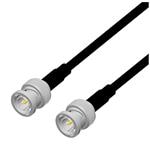Once I had demonstrated to myself that tweaking the stock BNC cables could incrementally improve SQ, I threw caution to the wind and ordered some audiophile ones. If I was a millionare, I probably would have just gone straight for the Habst silver ones. But I'm not a millionare, so I chose ones that were not insanely priced and had the reputation of being true giant killers - enter the Blaxius^2D.
From the first momement I tried them, the Blaxius cables did
not deliver an incremental improvement to the sound - instead they utterly transformed it!
To put that into perspective, my subjective initial reaction was that they
doubled the improvement given by the stock HMS. Or from a different perspective, the HMS+Blaxius in 44k passthrough mode sounded at least as good as HMS+stock at the full 1M taps - because although losing the taps lost much of the image height that HMS is famous for, the inherent Blaxius benefits of big tactile images/detail/depth/lack of glare made up for this to give an equally satisfying musical experience.
Important caveats: I didn't do rigorous A/B tests because I didn't feel it necessary. Once the Baxius cables were in they stayed in for good. So treat these impressions as food for thought rather than a conclusive result that will work or everyone. Also, the better the rest of the chain, the easier it will be to tell the difference.
Before anyone rushes off to try the Blaxisu^2 cables (around 250 euro each + VAT in EU countries), we need to address the elephant in the room. Or rather the elephant's trunk in the room, becuase these are thick, stiff cables. The thickness isn't such an issue - It would be great if they were 1mm less in diameter, or if the closely packed chord sockets were an extra 1mm further apart, but it all just about fits. The bigger challenge is the stiffness and large radius of curvature - you need to judge the length carefully to fit your components location, especially if you have little room between back of rack and the wall, so I suggest to contact
@PeterSt at Phasure for advice on this point.

























